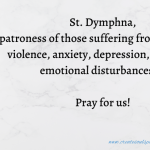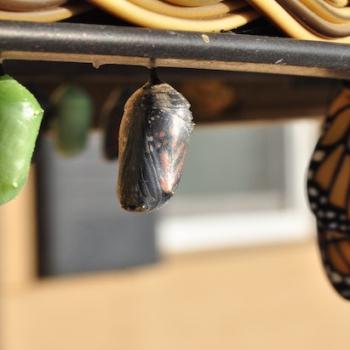Domestic violence is insidious, destructive and—let’s face it—evil. Regardless of whether the violence is physical, emotional, psychological or verbal, when the abuses are perpetrated by the one person you’re supposed to trust and be able to love unreservedly, the person who vowed to honor and cherish you all the days of your life, the effects of the betrayal trauma are enormous.

Abuse causes a rift and a fissure within the very core of self. It causes the target to completely lose her footing as the ground beneath her suddenly disappears and she realizes, with gasping, heart-racing shock, that a solid relationship has never truly been there in the first place.
The foundation of her marriage has been built on sand, not rock. Yet slowly, so slowly she’d barely noticed—or perhaps with one violent wave—the tide has come in and is now reaching her neck.
“And the rain fell, and the floods came, and the winds blew and beat against that house, and it fell; and great was the fall of it.”
(Matt 7:27)
Domestic abuse can be even more confusing, devastating and soul-wrenching for Catholics. As a domestic abuse advocate and survivor, one of the most common questions I receive goes something like this: I’m Catholic, so my marriage is a sacrament. Does that mean I’m stuck? Should I just be submissive and put up with the way things are?
The quick answer is no. Definitely not. In 1992—and revised in 2002—the United States Conference of Catholic Bishops (USCCB) published a definitive article on domestic abuse entitled “When I Call for Help: A Pastoral Response to Domestic Violence Against Women.” In this document the U.S. bishops firmly state:
We emphasize that no person is expected to stay in an abusive marriage. Some abused women believe that church teaching on the permanence of marriage requires them to stay in an abusive relationship. They may hesitate to seek a separation or divorce. They may fear that they cannot re-marry in the Church. Violence and abuse, not divorce, break up a marriage. We encourage abused persons who have divorced to investigate the possibility of seeking an annulment. An annulment, which determines that the marriage bond is not valid, can frequently open the door to healing.

This topic is obviously too vast to cover in a short article (I’ve dedicated several chapters to the complicated decisions facing Catholics in abusive marriages in my upcoming book, Don’t Plant Your Seeds Among Thorns: A Catholic’s Guide to Domestic Abuse). Here, I just want to lay a small yet solid foundation.
If you know something is wrong with your relationship but you’re not sure what, consider the following:
- Does your spouse verbally demean you, call you unkind names, make you feel stupid or at least not as intelligent and worthy as him? (Verbal abuse)
- Has your partner ever hurt you physically in any way (roughly grabbing your arm, hitting, strangling, slapping, pinching or any other type of physical assault), or is he physically threatening in other ways (punching holes in walls, aggressively slamming doors, throwing or breaking items)? (Physical abuse)
- Does your partner ever tell you that you’re going crazy, you don’t remember things correctly, that your story of what happened in a situation is wrong or messed up or that he never said or did something you’re sure he said or did? Do you fear you’re losing it, going crazy, that something might be wrong with your memory? (Psychological abuse)
- Do you experience fear or anxiety around your partner? Is your household more at peace when he’s not around? Are you walking on eggshells within your own home, unable to feel completely comfortable because you’re afraid you’ll trigger his terrifying side? Are you socially isolated from others, including close family or friends—those who could give you support, empathy and love? (Emotional abuse)
- Does your husband force or coerce you to have sex with him? Sexual abuse can take the form of forcing you physically (marital rape) or coercing you by making your life miserable if you don’t give in to his desire for sex (such as sending you on a guilt trip, badgering you until you give in, or depriving you of sleep until you’re too exhausted to honor your own needs any longer). (Sexual abuse)
All of the above are signs of domestic violence.
These destructive actions aren’t isolated, “one-off” events. Everyone makes mistakes, everyone says or does hurtful things in the heat of the moment, things they soon regret. They authentically apologize, not merely in words but in actions—meaning, they don’t repeat the harmful behavior. Especially not again, and again. And yet again.
In an abusive relationship, on other hand, there’s a distinct pattern of attitudes and actions that may disappear for a time, but eventually come creeping back in. This creates a terrifying, heartbreaking and crazy-making atmosphere within what should be the sacred space of a safe home.
Some further examples and signs of domestic violence include:
- threats to kill or harm one’s partner, children or pets
- extreme, controlling jealousy
- being deliberately evasive in conversation, omitting information, and other forms of lying
- constant criticism, both overt and covert
- the victim isn’t allowed to have opinions separate from her abuser
- forced vaccination, sterilization or abortion
- intimidation by subtle threats, looks, actions, or tone of voice
- blaming others or constantly making excuses for negative behaviors without taking responsibility for one’s own behaviors
- circular talk (conversations become dizzying and impossible to follow)
The consistent pattern of domestic abuse is baffling and disorienting, especially since aggression and manipulation aren’t a constant part of an abuser’s personality. Their innate character will eventually reveal itself to be like that of “Dr. Jekyll and Mr. Hyde.” Perhaps this sounds familiar: at one moment he can be extremely charming and sweet, and during those times you likely feel immense relief and even a displaced sense of gratitude. This stage may last hours, days, even weeks or monthsß, but eventually he becomes “Mr. Hyde” again, exploding in either overt rage or covert criticism.
These tactics are all part of the abuse cycle.
If you’re in a turbulent marriage, please know that there is help. Not only does the Catholic Church not expect you to tolerate abuse, but she supports you as you journey toward healing. The Church teaches that “we must always say no to violence in the home,” as Pope Francis stated in Amoris Laetitia.
There are many domestic abuse resources you can turn to for help, including:
- Create Soul Space: A Catholic’s Guide to Domestic Abuse
- Hope’s Garden
- Bloom for Catholic Women
- Catholics for Family Peace
- Pax in Familia
- Domestic Violence Outreach
- The National Domestic Violence Hotline
The statistics are sad—approximately one in three women have been or are victims of abuse within their own homes (85% of domestic abuse victims are women). But this also means you aren’t alone, and you don’t have to carry your burdens by yourself. You can reach out. We’re here for you.
“‘For I know the plans I have for you,’ declares the Lord, ‘plans for welfare and not woe, to give you a future and a hope.’”
(Jer. 29:11)













